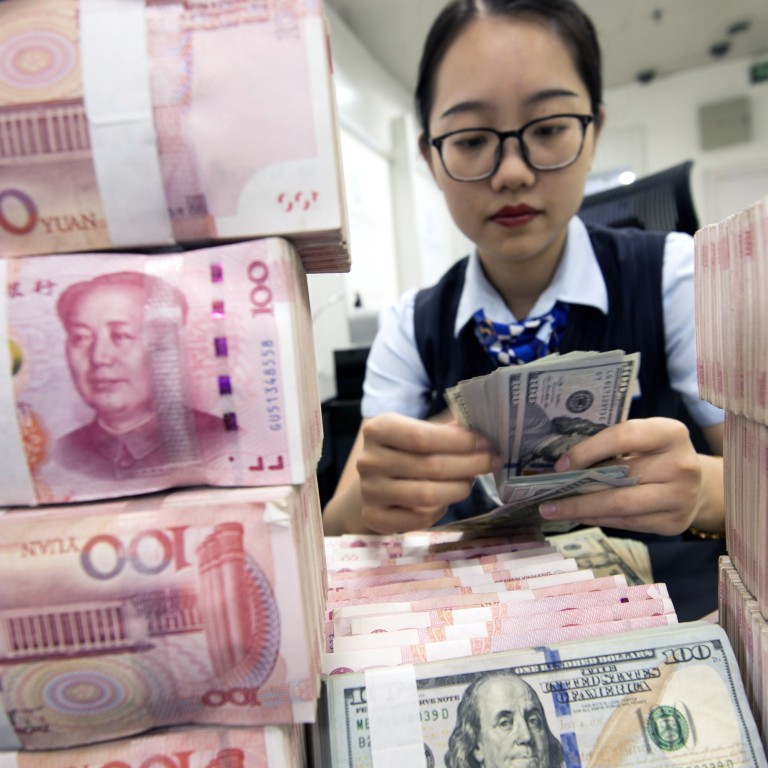
China’s US dollar debt defaults climb as coronavirus, US tensions hit firms’ bottom lines
- US dollar bond defaults by Chinese firms have jumped threefold to US$12 billion so far this year from US$4 billion for all of 2019
- Market confidence has been shaken, triggering a shortage of dollar liquidity that is limiting some firms’ ability to pay down debt
Defaults by Chinese firms on their US dollar-denominated debt have risen significantly this year as the coronavirus pandemic, a slump in oil prices and deteriorating US-China relations have hurt business and reduced their ability to repay.
US dollar bond defaults by Chinese firms have jumped threefold to US$12 billion so far this year from US$4 billion for all of last year, according to data from French financial firm Natixis.
As world central banks roll out large-scale monetary easing policies, the Asian corporate bond market is stabilising. Investors earlier this year dumped US dollar bonds in large volumes because of a squeeze on dollar financing that created challenges to meet payment obligations.
The default volume of the US dollar debt of Chinese firms is rising mainly because of weaker corporate fundamentals, pressuring internal liquidity
But amid rapidly deteriorating US-China relations and US dollar bonds maturing next year, bond defaults could grow, said Zhang Guo, managing director at China Chengxin (Asia-Pacific) Credit Ratings.
Chinese companies hold US$101.8 billion worth of US dollar bonds that mature this year, a figure which will increase 10 per cent in 2021 and surge another 19 per cent in 2022, according to data from Refinitiv.
Market concern about weak, highly-indebted Chinese firms is similar to March, when a massive dollar shortage led to turbulence in the corporate bond market, Zhang said.
“The default volume of the US dollar debt of Chinese firms is rising mainly because of weaker corporate fundamentals, pressuring internal liquidity,” Zhang said. “We need to consider macroeconomic factors since the pandemic overseas has not been controlled, while US-China tensions will also affect Chinese US dollar debt.”

06:02
Global expansion of TikTok and other Chinese tech companies is likely, only not in the West
Paul Au, head of fixed income at China Merchants Bank International, is more optimistic about the development of China’s US dollar bond market, despite risks Washington could sanction some Chinese banks, worsening the dollar shortage for Chinese firms.
China’s economy has recovered faster than the US or Europe, so investors will continue buying safe bonds issued by top Chinese financial companies, Au said.
“US investment firms and fund managers have subsidiary offices in Europe, Hong Kong and Singapore,” he said. “They do not need approval from their headquarters to make their investment decisions. In the world of investing, whichever place can give you a return is the place that allows you to earn a profit.”
Chinese policymakers eased US dollar debt rules in March to free up cheap US dollar borrowing for small and medium-sized enterprises (SMEs) hit hard by the coronavirus pandemic. This followed the US Federal Reserve’s massive injection of liquidity into the banking system.
After the liquidity crunch in March, investors generally have not been chasing high yield bonds despite their higher returns
Chinese companies have sold US$40 billion of bonds this quarter, up 5 per cent from the same quarter last year, Refinitiv data showed, reflecting improving corporate demand for dollar bonds.
While market sentiment has improved, it has not yet returned to pre-covid-19 levels. Investors are paying special attention to the creditworthiness of individual issuers, as well as a particular bond’s liquidity – the ability to quickly sell it – because of rising bond defaults, said Sophia Chen Yi-ling managing director at Guotai Junan International.
In the past, investors preferred US dollar bonds issued by Chinese property developers, which were viewed as riskier but had higher returns. However, since the global financial market turmoil in March, many investors have switched to buying higher-quality US dollar bonds issued by banks and other financial firms, Chen said.
“After the liquidity crunch in March, investors generally have not been chasing high yield bonds despite their higher returns,” Chen said. “Market uncertainty about US-China relations can bring market volatility.”
One default that shook investors’ faith in China’s offshore bonds was the bankruptcy of a conglomerate backed by the nation’s most prestigious university.
Peking University Founder Group recently issued a formal announcement confirming five of its overseas bonds worth a total of US$1.7 billion were not recognised as ordinary creditor claims in its bankruptcy, raising questions about the enforceability of foreign claims on China’s offshore debt.
Jim Veneau, head of Asian fixed income at AXA Investment Managers, said there was a clear demarcation between bonds issued by strong companies that had taken advantage of cheap dollar funding and recovered quickly, and weak companies that continue to face elevated risks from the pandemic.
“For companies that have not recovered, they are fundamentally distressed, and are probably not coming back to the market,” Veneau said. “[These] segments and names are under pressure and are going to default because they can’t service their debt as the market is essentially closed to them.”
At the same time, China’s latest policies to control debt owned by property developers – the main borrowers of offshore financing – is weighing on the real estate sector.
Last month, the People’s Bank of China and the Chinese Ministry of Housing and Urban-Rural Development set three financial ratio “red lines” for domestic property developers.
Total debt could not exceed 70 per cent of the value of a firm’s assets or more than 100 per cent of a firm’s equity. Short-term debt was limited to 100 per cent of a firm’s cash reserves, while growth in outstanding interest-bearing debt was also capped.

02:39
The ‘Yiwu Index’: How a Chinese city could predict the result of the US Presidential election
In addition, Gary Ng, Asia-Pacific economist at Natixis Bank, said that Chinese US dollar bond issuers in the semiconductor and technology sector could be pressured more because of trade war disruptions to their supply chains. These firms have the highest exposure to overseas markets, with foreign revenues at 49 per cent and 37 per cent of turnover, respectively.
The default rate for state-owned enterprises in the US dollar debt market has climbed above that of private firms for the first time, Ng said.
State-owned enterprise Tewoo Group became the largest defaulter on US-dollar bonds in China’s history when it entered court controlled restructuring in July, which included five US-dollar bonds with a total value of US$1.75 billion.
“Default rates are rising no matter what,” said Ng. “Investors are pricing relatively high risk in Chinese [corporate debt], even though it’s much improved from March levels.”

